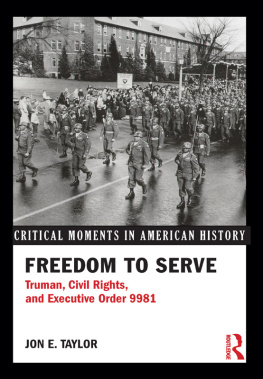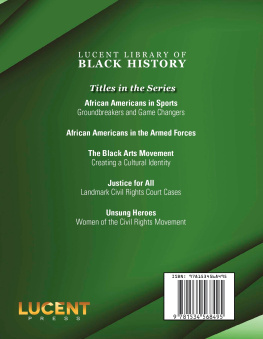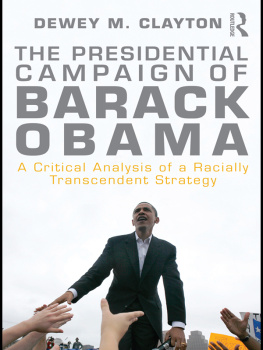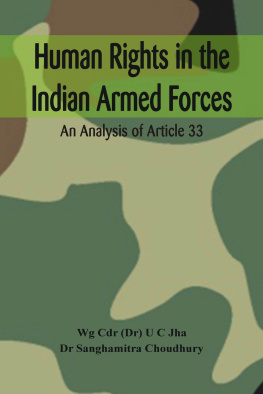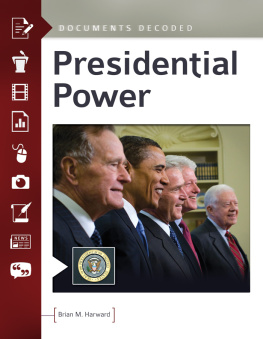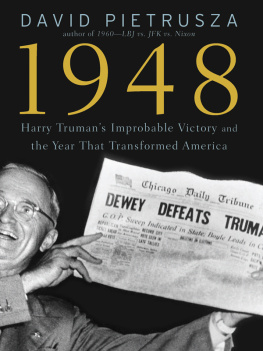Freedom to Serve
On the eve of America's entry into World War II, African American leaders pushed for inclusion in the war effort and, after the war, they mounted a concerted effort to integrate the armed services. Harry S. Truman's decision to issue Executive Order 9981 in 1948, which resulted in the integration of the armed forces, was an important event in twentieth century American history.
In Freedom to Serve, Jon E. Taylor gives an account of the presidential order as an event that forever changed the U.S. armed forces, and set a political precedent for the burgeoning civil rights movement. Including press releases, newspaper articles, presidential speeches, and biographical sidebars, Freedom to Serve introduces students to an under-examined event while illuminating the period in a new way.
For additional documents, images, and resources please visit the Freedom to Serve companion website at www.routledge.com/cw/criticalmoments
Jon E. Taylor is Professor of History at the University of Central Missouri.
Critical Moments in American History
Edited by William Thomas Allison, Georgia Southern University
The Battle of the Greasy Grass/Little Bighorn
Custer's Last Stand in Memory, History, and Popular Culture
Debra Buchholtz
Freedom to Serve
Truman, Civil Rights, and Executive Order 9981
Jon E. Taylor
Freedom to Serve
Truman, Civil Rights, and Executive
Order 9981
Jon E. Taylor
First published 2013
by Routledge
711 Third Avenue, New York, NY 10017
Simultaneously published in the UK
by Routledge
2 Park Square, Milton Park, Abingdon, Oxon OX14 4RN
Routledge is an imprint of the Taylor & Francis Group, an informa business
2013 Jon E. Taylor
The right of the author to be identified as the author of the editorial material, and of the authors for their individual chapters, has been asserted in accordance with sections 77 and 78 of the Copyright, Designs and Patents Act 1988.
All rights reserved. No part of this book may be reprinted or reproduced or utilised in any form or by any electronic, mechanical, or other means, now known or hereafter invented, including photocopying and recording, or in any information storage or retrieval system, without permission in writing from the publishers.
Trademark notice: Product or corporate names may be trademarks or registered trademarks, and are used only for identification and explanation without intent to infringe.
Library of Congress Cataloging in Publication Data
Taylor, Jon E., 1968-
Freedom to serve: Truman, civil rights, and Executive Order 9981/
by Jon E. Taylor.
p. cm.
Includes bibliographical references and index.
1. Truman, Harry S., 18841972Political and social views.
2. United StatesArmed ForcesAfrican AmericansHistory
20th century. 3. United States. President's Committee on Equality
of Treatment and Opportunity in the Armed Services. Freedom to
serve. 4. SegregationLaw and legislationUnited StatesHistory
20th century. 5. African American soldiersHistory20th century.
6. African AmericansSegregationHistory20th century. 7. African
AmericansCivil rightsHistory20th century. 8. Civil rights
United StatesHistory20th century. I. United States. President's
Committee on Civil Rights. To secure these rights. II. Title.
UB418.A47T39 2012
355.3308996073-dc23
2012011993
ISBN: 978-0-415-89449-4 (hbk)
ISBN: 978-0-415-89448-7 (pbk)
ISBN: 978-0-203-08152-5 (ebk)
Typeset in Bembo and Helvetica Neue
by Florence Production Ltd, Stoodleigh, Devon
To all of those who served,
but especially for Rhonda and Braden
Contents
Series Introduction
Welcome to the Routledge Critical Moments in American History series. The purpose of this new series is to give students a window into the historian's craft through concise, readable books by leading scholars, who bring together the best scholarship and engaging primary sources to explore a critical moment in the American past. In discovering the principal points of the story in these books, gaining a sense of historiography, following a fresh trail of primary documents, and exploring suggested readings, students can then set out on their own journey, to debate the ideas presented, interpret primary sources, and reach their own conclusionsjust like the historian.
A critical moment in history can be a range of thingsa pivotal year, the pinnacle of a movement or trend, or an important event such as the passage of a piece of legislation, an election, a court decision, a battle. It can be social, cultural, political, or economic. It can be heroic or tragic. Whatever they are, such moments are by definition game changers, momentous changes in the pattern of the American fabric, paradigm shifts in the American experience. Many of the critical moments explored in this series are familiar; some less so.
There is no ultimate list of critical moments in American historyany group of students, historians, or other scholars may come up with a different catalog of topics. These differences of view, however, are what make history itself and the study of history so important and so fascinating. Therein can be found the utility of historical inquiryto explore, to challenge, to understand, and to realize the legacy of the past through its influence of the present. It is the hope of this series to help students realize this intrinsic value of our past and of studying our past.
William Thomas Allison
Georgia Southern University
Figures
W. E. B. Du Bois: founding member of the National Association for the Advancement of Colored People
African American soldiers on patrol somewhere in Europe during World War II
Harry Truman served as Captain of Battery D, which saw action in France during WWI
The President's Advisory Commission on Universal Training presents A Program for National Security to Harry Truman
The family of Sgt. Cornelius H. Charlton, accepts posthumously the Congressional Medal of Honor for actions that he had taken in the Korean War
Abbreviations
| AGCT | Army General Classification Test |
| CHR | [United Nations] Commission on Human Rights |
| CIC | Commission on Interracial Cooperation |
| CORE | Congress of Racial Equality |
| CRC | Civil Rights Congress |
| EO 8802 | Executive Order that created the Fair Employment Practices Committee |
| EO 9808 | Executive Order that created the President's Committee on Civil Rights |
| EO 9980 | Executive Order that prohibited discrimination in federal employment based on race, color, religion, or national origin |
| EO 9981 | Executive Order that created the Committee on Equality of Treatment and Opportunity in Armed Services (Fahy Committee) |
| EO 10210 | Executive Order related to non-discrimination in defense contracting for the Korean War |
| FEPC | Fair Employment Practices Committee/Commission |
| NAACP | National Association for the Advancement of Colored People |
| NCJC |

